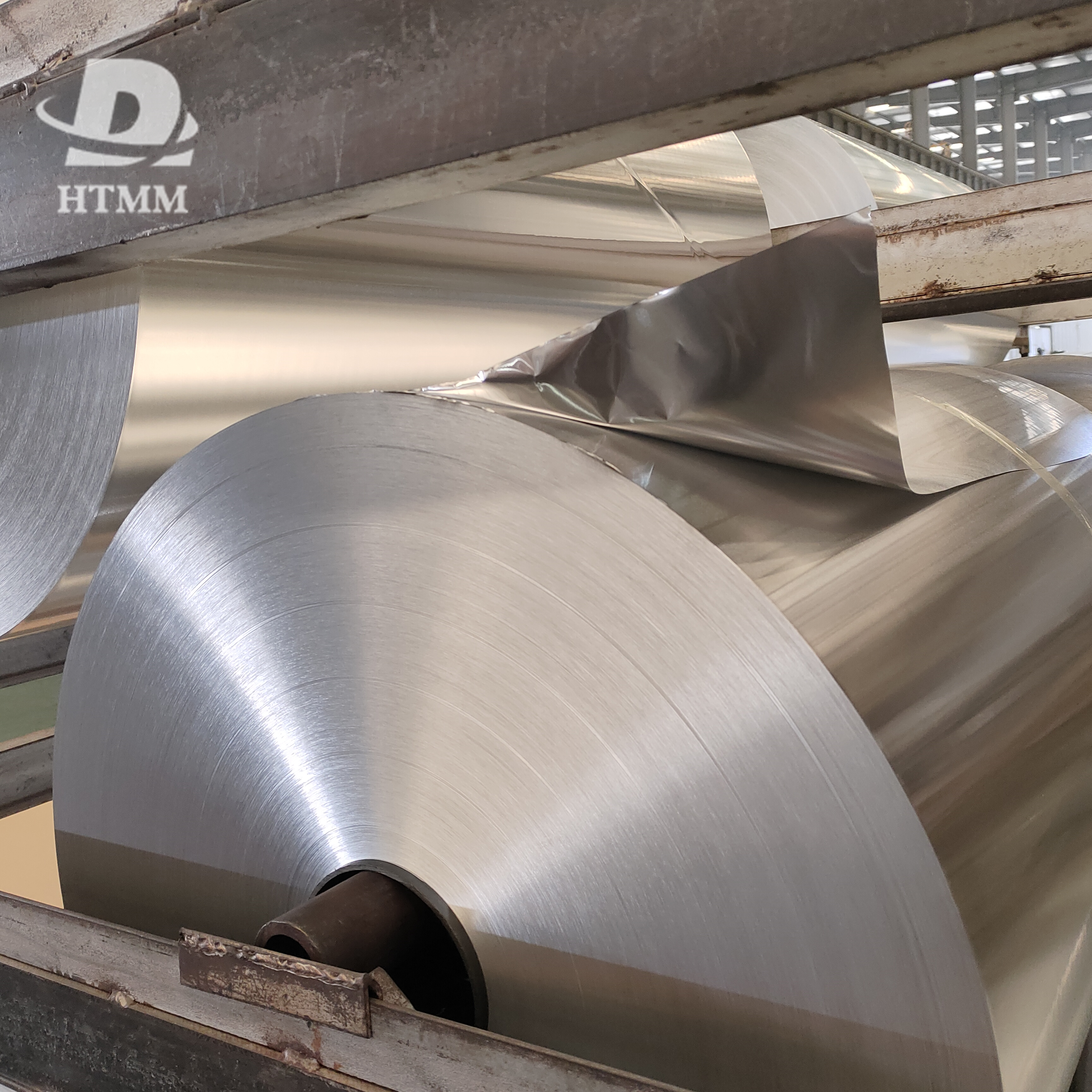 One of the core properties of aluminum foil that contributes to food safety is its barrier effect against gases, moisture and contaminating microorganisms. Aluminum's dense crystal structure and inorganic nature make it non-porous in standard thicknesses ranging from 0.00035" to 0.00050". The foil has no pores for pathogens to pass through, creating an impermeable barrier that separates food contents from external contaminants.
One of the core properties of aluminum foil that contributes to food safety is its barrier effect against gases, moisture and contaminating microorganisms. Aluminum's dense crystal structure and inorganic nature make it non-porous in standard thicknesses ranging from 0.00035" to 0.00050". The foil has no pores for pathogens to pass through, creating an impermeable barrier that separates food contents from external contaminants.
If you are interested in industrial aluminum foil, flexible packaging aluminum foil or household aluminum foil, you can contact us. HTMM is only the most professional aluminum foil manufacturer!
This quality makes aluminum foil ideal as the primary contact layer or outer film packaging for a variety of perishable and processed items. It provides a hygienic barrier that protects food from potential microbiological issues in the packaging environment and ensures that consumer packaging remains sealed until opened.
Aluminum's gas and moisture barrier far exceeds that of alternative packaging materials such as paper, individual plastic films or untreated cardboard, which can harbor or spread pathogens if broken during production or storage. The foil's dense lattice structure prevents molecular penetration, creating an intrinsic barrier.
Adding a specialized high-barrier polymer coating to the surface of the aluminum foil, such as polyethylene, ethylene vinyl alcohol (EVOH), polyamide, polyvinylidene chloride (PVDC) or aluminized polyethylene terephthalate (APET) , doubling its already excellent blocking ability. Coated foil forms a reliable barrier, even against oxygen and carbon dioxide, helping to maintain a long product shelf life.
The combination of a dense foil substrate and an optimized high-performance coating provides packaging that reliably separates edible contents from potential sources of contamination, allowing for clean product flow and maximum food safety. Additionally, the inertia of 8011 aluminum foil makes accidental damage from cuts or tears during production less likely.
In addition to being a barrier, industrial aluminum foil contributes to food safety and preservation by enabling the various heat treatments and sterilization technologies that manufacturers rely on. As discussed in previous articles, the foil's high thermal conductivity combined with optional heat-resistant coatings and alloys make it ideal for temperatures up to 500°F and above.
This thermal property enables industrial foils to interface directly with processing equipment or undergo rapid temperature transitions associated with sterilization without failure or degradation. Some examples include:
Hot filling operation
Aseptic Packaging: Aluminum foil forms an interior reclosable lid laminate for hot filling of sterile cartons and bags for liquids above 212°F, such as soup or baby food, to kill microorganisms and extend shelf life by more than 6 months (Not refrigerated).
Short-term sterilization: Flash or tunnel pasteurization subjects prepackaged baked goods, entrees, and more to steam at 180-250°F for a few seconds to eliminate potential pathogens present in post-packaging processing without overdoing it. Cooking contents.
Boil-in/cook-out bags: Entrees such as ravioli or rice/vegetable mixtures are placed uncooked in an inner foil bag and sterilized in the finished package by exposure to 350°F convection oven temperatures.
Autoclave Sterilization: Medical device components and labware made from aluminum foil can be repeatedly exposed to saturated steam at 15-20 psi at 275-300°F to eliminate microbial contaminants that can survive other treatments.
Research-proven heat treatment results in effective sterilization or pasteurization, reducing common human pathogens such as E. coli, salmonella and listeria by at least 5-6 logs while extending the environmentally stable shelf life of the product. Aluminum foil plays a key role in supporting these comprehensive approaches to food safety.
 As packaged food moves through the supply chain from producer to consumer, maintaining the protective barrier provided by primary and secondary packaging intact is critical to ensuring hygienic safety. Aluminum foil rolls is a strong yet lightweight material that protects package seals, integrity, and contents from compression and other abuse during storage and transportation.
As packaged food moves through the supply chain from producer to consumer, maintaining the protective barrier provided by primary and secondary packaging intact is critical to ensuring hygienic safety. Aluminum foil rolls is a strong yet lightweight material that protects package seals, integrity, and contents from compression and other abuse during storage and transportation.Its stiffness, dead-fold characteristics, and ability to withstand crush loads up to 300 lb/in. No damage beyond individual flexible packaging films, parchment paper or plastic wrap. Properly packaged aluminum foil keeps the airtight packaging seal intact.
The rigors of delivery subject packages to stacking stress, shock and wear and tear as they change hands through supply networks. Aluminum’s inherent strength maintains critical packaging seals, preventing contaminant penetration and preserving freshness until final unpacking. The dead-fold feature allows the compressed packaging to easily spring back to its original shape after receipt without being disturbed.
Additionally, with appropriate coating selection, aluminum foil can form a reclosable interior lid surface for bulk bags containing snacks, crumbs, or other dry ingredients. Unlike dust-collecting plastic films, the non-stick properties of aluminum foil can be opened and closed multiple times by different users during the delivery process, keeping the contents free of contamination.
Comply with global food safety standards
 Promoting food safety depends on compliance with comprehensive regulatory standards to demonstrate effective control of potential hazards. Leading global food safety certifications such as SQF, BRCGS, FSSC 22000 and ISO 22000 assess all aspects of factory operations, procedures, traceability systems and the selection/application of packaging materials to reduce risk.
Promoting food safety depends on compliance with comprehensive regulatory standards to demonstrate effective control of potential hazards. Leading global food safety certifications such as SQF, BRCGS, FSSC 22000 and ISO 22000 assess all aspects of factory operations, procedures, traceability systems and the selection/application of packaging materials to reduce risk.Industrial aluminum foil facilitates compliance with these internationally recognized certifications due to its inert, migratory-free composition, non-porous barrier construction when used correctly, heat treatment support, and consistent packaging protection benefits. Facilities that use aluminum responsibly as part of a verified HACCP program meet the packaging material requirements of these globally relevant certifications.
Items packaged in traceable aluminum foil or foil laminate structures have earned an enhanced reputation for proven quality and safety assurance. Consumer skepticism about the potential risks posed by packaging has reduced awareness of the internationally scrutinized standards that support the properties of aluminum, making the processing environment and final distributed product free from contamination at every step under the control of the facility.
When thoughtfully incorporated as part of an overall food safety plan, industrial aluminum foil provides benefits that protect products, consumers and brand reputation. Its barrier properties, heat treatment support, maintenance of packaging integrity during distribution and compatibility with global food safety certifications help manufacturers meet regulations covering all aspects of food production to consumption. With appropriate controls and communication validated by schemes such as GFSI, aluminum foil can reliably fulfill its role in ensuring public health.

If you are interested in industrial aluminum foil, flexible packaging aluminum foil or household aluminum foil, you can contact us. HTMM is only the most professional aluminum foil manufacturer!

